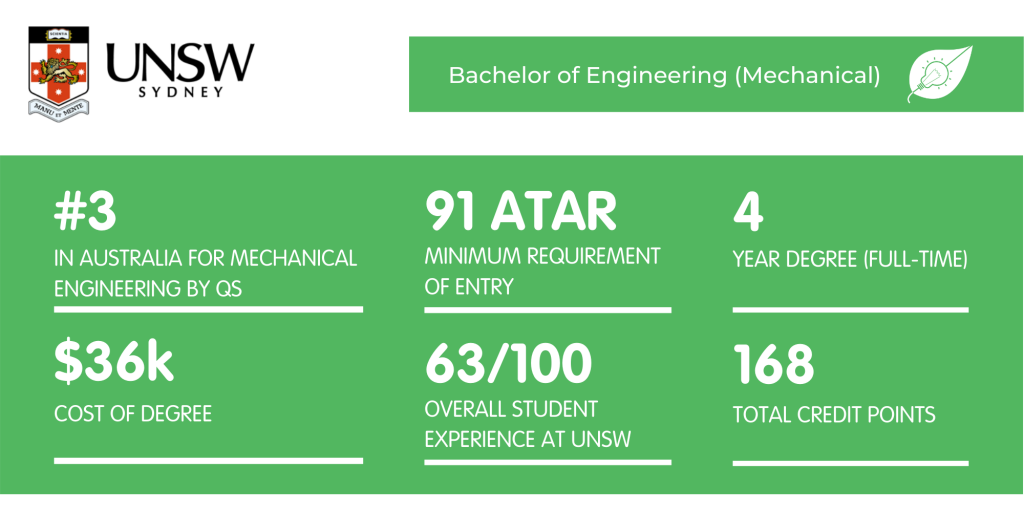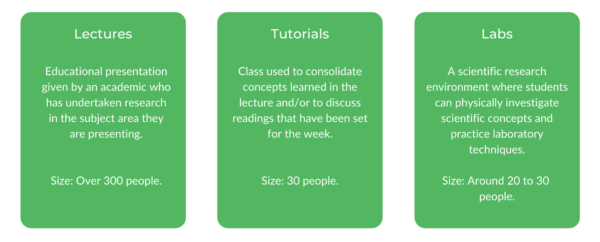Are you thinking of studying Mechanical Engineering at UNSW but aren’t 100% sure yet?
We have all the info you need to make an informed decision! From cohort to core units, we have you covered!
Check it out!
What is Mechanical Engineering at UNSW?
Core Units for this Degree
How to Get into Mechanical Engineering at UNSW
What’s the Teaching Format?
What’s the Faculty and Culture Like?
What is Mechanical Engineering at UNSW?
Mechanical Engineering at UNSW, like its name suggests, provides students with a sound knowledge of everything mechanical! As a major of the Bachelor of Engineering, within mechanical engineering, you will be taught how to apply your engineering knowledge to designing and managing the construction, operation and maintenance of machinery operated within various industries.
You’ll find yourself highly engaged in this degree if you’re keen on learning about designing and manufacturing machines and tools. This major is also perfect for people who love solving problems, pulling things apart to see how they function, and using their creativity to design new tools—everything is very hands-on!
Honours
The Bachelor of Engineering is already an Honours degree, but this doesn’t mean that every student is accepted into the Honours program—students are required to maintain a WAM of no less than 50. If you progress into Honours, you’ll complete your final year by choosing a research topic under the guidance of a tutor or professor to produce a thesis.
Can this degree be studied in conjunction with another?
Mechanical Engineering at UNSW can be paired with another degree, so that you come out with two qualifications at the conclusion of your studies. This, however, will mean that you will spend extra time working towards your double degree.
Popular additions to the Bachelor of Engineering (Mechanical) at UNSW include;
Career Paths
The career paths for UNSW Mechanical Engineering are quite varied. Mechanical engineers are involved in so many different fields—sometimes they even need to learn how to market and sell the machines they create!
Some of the industries that a mechanical engineer can end up in include:
-
- Automotive
- Aerospace and transport
- Power generation
- Insurance
- Building services
- Railway systems design
- Consumer goods design and production
- Management consultancies
Core Units for this Degree
As mentioned previously, Mechanical Engineering is a major of the Bachelor of Engineering—when you choose to study Engineering at UNSW, you essentially select your major as soon as you enrol. This means that you don’t actually pick any majors in your second year of study, unless you’re completing a double degree that requires you to do so.
Compulsory Mechanical Engineering Units
There are quite a number of core units that you’ll have to complete within UNSW Mechanical Engineering. But don’t fret—these subjects will only provide you with the necessary knowledge and skills for when you begin your career as a mechanical engineer after graduating!
Some of these core units include Electrical Circuit Fundamentals, Mathematics 1A and Design and Manufacturing.
The following are other compulsory subjects that Mechanical Engineering students will take on:
| Core Unit | Description |
|---|---|
| Introduction to Engineering Design and Innovation | This unit has a focus on helping students learn to think like an engineer. They will learn this ability by designing and building creative solutions to problems that are presented. Students will learn new skills in content development, critical thinking and evaluation. |
| Physics 1A | This unit is based on calculus and aims to give students a better understanding of mechanics, thermal physics and waves! It is assumed that students have a HSC level understanding of Physics, however, there are bridging courses to get you up to speed—more on this later! |
| Programming Fundamentals | This course is an introduction to problem solving with the use of programming. Students will learn how to understand and implement computer language and literacies and analyse algorithms. |
You can learn more about core units here!
Industrial Training
Lucky for you, this degree’s got practical work experience embedded into it! You are required to complete 60 days of Industrial Training in order to graduate from your degree.
It’s up to you, however, to organise and source your placement—the hard work will be worth it though, as you’ll have practical experience that employers seek when hiring. You won’t be left to your own devices, as Student Academic and Career Success (SACS), a program by UNSW, helps students with resume and application writing by giving critiques and pointers into the right direction.
How to Get into Mechanical Engineering at UNSW
The ATAR cut off for guaranteed entry into a Bachelor of Engineering (Mechanical) at UNSW is 91. However there is another way into the degree!
Alternate Pathways
The Faculty of Engineering Admissions Scheme is a program that aims to help students who are unable to achieve the required ATAR of 91 to get into the course. If you’ve received an ATAR that is just 10 points below guaranteed entry, a team will evaluate your application!
All you need to do to apply is include a personal statement, send an attachment of your Year 12 report and upload a short video explaining why you are suited to study engineering of some discipline at UNSW here!
Prerequisites/Assumed Knowledge
There are no prerequisite subjects needed to be studied prior to commencing UNSW Mechanical Engineering, however, there are subjects that are assumed knowledge. This means that your tutors will teach you at a level that assumes you have studied subjects at a HSC level.
The assumed knowledge subjects are Extension Mathematics 1 and Physics—if you haven’t studied these subjects in your HSC years, don’t worry! UNSW hosts catch up bridging courses for both Mathematics and Physics, which will fill in all the gaps and get you ready to progress into your Bachelor studies.
Scholarships
UNSW offers a large range of scholarships! There are scholarships offered for broad and differing circumstances and achievements.
To have a look and see if you’re eligible, check out the UNSW Scholarships Calculator tool here!
What’s the Teaching Format?
UNSW follows the trimester teaching pattern. This means that subjects each year will be taught over three sessions of 10 week increments with breaks in between.
Students must take on three subjects each trimester to complete a full-time study load. However, students also have the option to complete two subjects for one trimester each year and still be set to complete their degree on time!
Class Structure
The teaching format for the Bachelor of Mechanical Engineering varies from unit to unit, however here is a list of the class formats you can expect to undertake within this degree:
Lectures
Typically lasting 2 hours occurring a couple of times a week with each unit, a lecture will introduce Mechanical Engineering students to new topics and theories. There isn’t much room for class discussion, so it’ll be a lot of learning by listening—application comes later in tutes and labs.
You’ll also find yourself surrounded by many students, with some lectures having over 300 students attending!
Tutorials
These classes complement your lectures, as they give you the chance to collaborate with other students, ask questions about the content, and complete relevant activities to ingrain that knowledge into your head! Tutes usually occur after the lecture in a much smaller classroom of 30 people, and they tend to run for an hour and a half.
Labs
With a smaller class of around 20 to 30 students, labs are a more hands-on and practical method of learning—you can expect these classes to go anywhere from 1-4 hours depending on the unit. Within labs you can expect to do group work, experiments and make your own mechanical creations!
How much time will you spend on campus?
The contact hours for the UNSW Mechanical Engineering are quite large with students on campus for around 15-22 hours a week, however, this isn’t being noted to daunt students. This enables students to collaborate, ask their tutors questions and find the best places to eat on campus!
Assessments
The types of assessments you’ll complete as a Mechanical Engineering student are extremely varied, as students are pushed to learn and present their takeaways through different methods. You’ll mainly be assessed through:
-
- Assignments such as group work or reports
- Exams — midterm and final
- Labs
- Practical examinations
- Coding exams
Skills That You Refine and Learn
As a future mechanical engineer, this degree sets you up by fostering and helping you develop a multitude of skills!
You’ll learn to be proficient in analysis — coming up with exact numbers and figures but also analyse the results of their practical experiments and builds. You’ll also become a better team player, as you’ll potentially need to rise up to the challenge of leading a group to complete your assignments.
Not only do you improve your ability to work in a team, you learn to think more critically and creatively. You will learn to push yourself out of the typical box of ideas that have been completed before and try something new and contemporary.
What’s the Faculty and Culture Like?
UNSW Mechanical Engineering resides within the Engineering Faculty — a large, multifaceted faculty that prides itself on having passionate, driven and interesting lecturers. The drive is infectious within the Mechanical Engineering cohort, with students echoing the passion radiated from their lecturers!
Societies
Students within Mechanical Engineering are diverse, fun and driven! A way to connect with your fellow peers is through societies and UNSW is filled with so many of them.
These are some of the most popular ones among Mechanical Engineering students:
MechSoc
MechSoc is your go-to society for all students studying a mech degree — mechanical, aerospace, mechatronic or manufacturing! They offer a wide range of events to help students engage socially and professionally, but the most important thing is the sense of community you get from joining MechSoc.
The best way to get involved in first year is by attending the Annual First Year Camp, where you’ll be able to make friendships that last your whole degree and even beyond!
UNSW Engineering Society
The UNSW Engineering Society or EngSoc is open to all students studying any form of Engineering within the nine different disciplines UNSW offers. EngSoc offers students the opportunity to network, mingle, socialise and connect with students and alumni from the Engineering Faculty of UNSW.
Women in Engineering
The Women in Engineering or WIE group is catered towards female-identifying students who study within the faculty of Engineering at UNSW! WIE aims to keep their members up to date with opportunities and job prospects.
WIE even gives helpful workshops and networking sessions to women involved in WIE!
Mentoring
UNSW also hosts a peer mentoring program, aimed at first years to settle into uni life!
Student Peer Mentoring helps undergraduate students seeking a mentor who can help them learn the ins and outs of uni life! Depending on availability, first year students will be paired up with a mentor from second year and beyond in either the same Bachelor’s or at least the same discipline!
Other Types of Engineering
UNSW offers many different types of majors for its Engineering degree. If you’re still a bit unsure about whether Mechanical Engineering is for you, check out our articles on the other majors:
Interested in learning about the pros and cons of this degree? Check out our article here!
Matilda Elliott is a Content Writer at Art of Smart and a Communication graduate with a major in Journalism at Western Sydney University. You can find some of her published work in a range of platforms including SBS World News, The Music Network and within her own creative exploits with her twin sister. Matilda is a lover of listening, helping people to tell their stories, making genuine connections, clowning around in her circus troupe and dancing like no one is watching at live music shows!






